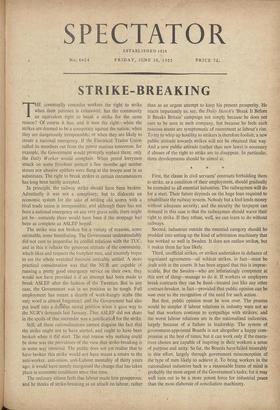STRIKE-BREAKING
THE community concedes workers the right to strike when their patience is exhausted; has the community an equivalent right to break a strike for the same reason? Of course it has; and it uses the right—when the strikes are deemed to be a conspiracy against the nation; when they are dangerously irresponsible; or when they are likely to create a national emergency. If the Electrical Trades Union called its members out from the power stations tomorrow, for example, the Government would promptly replace them; only the Daily Worker would complain. When petrol lorrymen struck on some frivolous pretext a few months agd neither stones nor abusive epithets were flung at the troops sent in as substitutes. The right to break strikes in certain circumstances has long been tacitly accepted.
In principle, the railway strike should have been broken. Admittedly it was not a conspiracy; but to dislocate an economic system for the sake of settling old scores with a rival trade union is irresponsible; and although there has not been a national emergency oh any very grave scale. there might yet be—certainly there would have been if the stoppage had been as complete as A-SLEF hoped.
The strike was not broken for a variety of reasons, some estimable, some hUrniliating. The Government understandably did-not care to jeopardise its cordial relations with the TUC; and in this it reflects the generous attitude of the community. which likes and respects the footplate men, and sincerely hopes to see the whole wretched business amicably settled. A more practical consideration was that the NUR are capable of running a pretty good emergency service on their own; they would not have provided it if an attempt had been. made to break ASLEF after the fashion of the Twenties. But in any case, the Government was in no position to be tough. Full employment has meant a dearth of work-hungry scabs (the very word is almost forgotten); and the Government had also put itself into a dugi6us moral position when it gave way to the NUR's demands last January. That ASLEF did not share in the spoils of that surrender was a justificatioA for the strike.
Still, all these rationalisations cannot disguise the fact that the strike ought not to have started, and ought to have been brokeit when it did start. The real reason why nothing could be done was the prevalence of the view that strike-breaking is in some way immbral. The public does not yerrealise that to have broken this strike would not have meant a return to the anti-worker, anti-union, anti-Labour mentality of thirty years ago; it would have merely recognised the change that has taken n place in economic conditions since that time.
The ordinary citizen feels that labour Made him prosperous; and he thinks of strike-breaking as an attack on labour, rather than as an urgent attempt to keep his present prosperity. He reacts impatiently to, say, the Daily Sketch's 'Break It Before It Breaks Britain' campaign not simply because he does not care to be seen in such company, but because he feels such raucous stunts are symptomatic of resentment at labour's rise. To try to whip up hostility to strikers is therefore foolish; a new public attitude towards strikes will not be obtained that way. And a new public attitude (rather than new laws) is necessary if abuses of the right to strike are to disappear. In particular, three developments should be aimed at.
First, the clause in civil servants' contracts forbidding them to strike, as a condition of their employment, should gradually be extended to all essential industries. The railwaymen will do for a start. Their future depends on the huge loan required to rehabilitate the railway system. Nobody but a fool lends money without adequate security; and the security the taxpayer can demand in this case is that the railwaymen should waive their right to strike. If they refuse, well, we can learn to do without railways.
Second, industries outside the essential category should be prodded into setting up the kind of arbitration machinery that has worked so well in Sweden. It does not outlaw strikes, but it makes them far less likely.
Third, unofficial strikes, or strikes undertaken in defiance of negotiated agreements—all wildcat strikes, in fact—must be ,dealt with in the courts. It has been argued that this is imprac- ticable. But the Swedes—who are infuriatingly competent at this sort of thing—manage to do it. If workers or employers break contracts they can be fined—treated just like any other contract-breaker, in fact—provided that public opinion can be won over to the recognition of the need for such action.
But first, public opinion must be won over. The process would be simpler if labour relations in industry were not so bad that workers continue to sympatl4se with strikers; and the worst labour relations are in the nationalised industries, largely because of a' failure in leadership. The system of government-appointed Boards is not altogether a happy com- promise at the best of times, but it can work only if the execu- tives chosen are capable of inspiring in their workers a sense of purpose and unity. So far, the Boards have failed miserably in this effort, largely through government misconception of the type of men likely to achieve it. To bring workers in the nationalised industries back to a reasonable frame of mind is probably the most urgent of the Government's tasks; for it may well turn out to be a more potent force for industrial peace than the most elaborate of conciliation machinery.










































 Previous page
Previous page